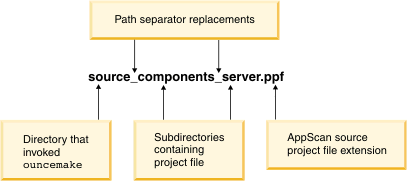Naming project files
Ounce/Make uses conventions outlined in this topic to name AppScan® Source project files.
- When creating AppScan Source project files, Ounce/Make uses the relative directory path from the directory in which you invoked ouncemake to the directory where ouncemake creates the project file.
- The directory where you invoke ouncemake becomes the first component in the path name.
- Underscores replace all path separators such as backslash (
\) on Windows™ and slash (/) on Linux™. - When the filename length exceeds operating system limitations, Ounce/Make strips components of the path, starting on the left, until the filename length complies with the system naming convention.
- When you run ouncemake at the root of a file system, such as / or c:\, ouncemake creates an AppScan Source project file named root.ppf.
AppScan Source saves the created .ppf in the location next to the makefile that the ppf represents. For example, if you run Ounce/Make, creating a single project file, AppScan Source saves the ppf in the directory from which you invoked Ounce/Make. Refer to Example 2: Ounce/Make with recursive option to see the ppf files created in multi-project mode.
Example 1
This example illustrates a ppf file created with the path separators replaced by underscores.
Invoke ouncemake from
the following directory:
C:\development\sourceDuring execution, Ounce/Make creates an AppScan Source project file in:
C:\development\source\components\serverThe name of the ppf is source_components_server.ppf:

Example 2
Microsoft™ Windows and Linux limit path and file names. These operating systems limit the number of characters to 255. Example 2 shows the case of a filename exceeding path length limitations.
User invokes Ounce/Make from the following directory:
C:\path1\path2\path3\path4\path5\development\sourceDuring execution, Ounce/Make creates an AppScan Source project in the following directory:
C:\path1\path2\path3\path4\path5\development\source\components\serverIf the filename can be a maximum of 25 characters, due to path limitations, the resulting filename is:
components_server.ppf